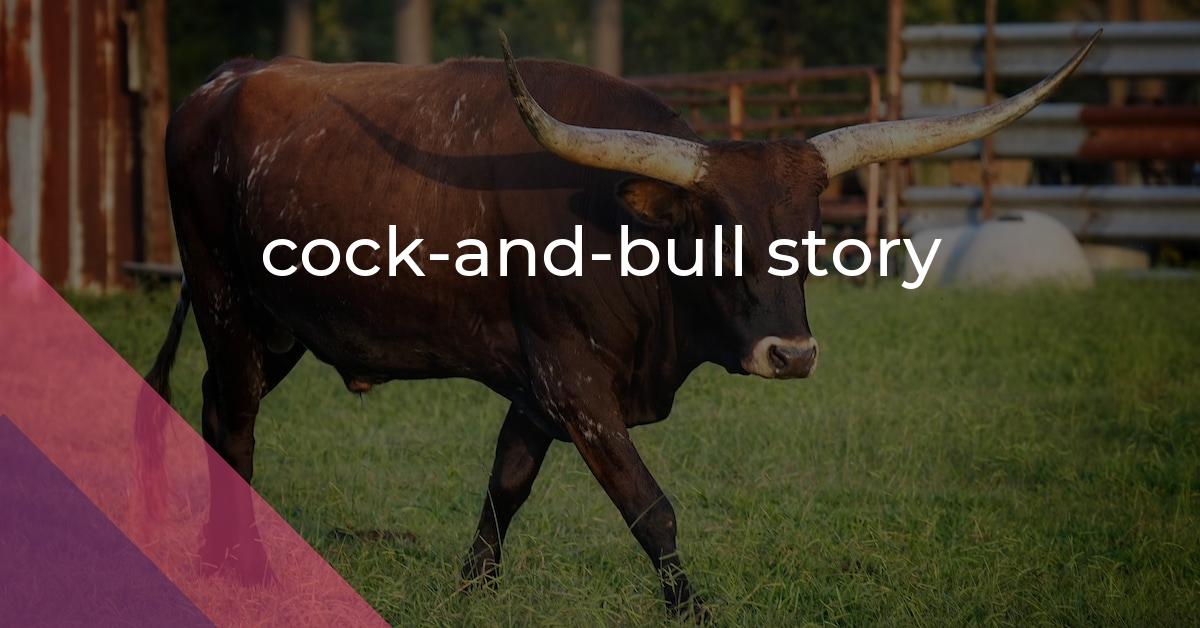cock-and-bull story: Idiom Meaning and Origin
What does ‘cock-and-bull story’ mean?
A cock-and-bull story is a far-fetched or unbelievable tale that is often fabricated or exaggerated.

Idiom Explorer
A "tall tale" is an exaggerated or fictional story that is often used to entertain or impress others. It may involve unbelievable events or highly exaggerated details, making it difficult to determine what is true and what is not.
"In a pig's arse" is an idiom used to express strong disbelief or denial. It indicates that something is highly unlikely or impossible to occur. The phrase draws on the image of an unimaginable or absurd situation, associating it with the rear end of a pig for emphasis.
The idiom "horror show" is commonly used to describe a situation or event that is extremely unpleasant, horrifying, or disturbing.
The idiom "holy cow" is an expression of surprise or astonishment. It is used to convey a sense of amazement or disbelief in a situation or event.
A "grain of truth" is a small amount of truth or validity behind a statement or belief, even if it may be mostly false or exaggerated.
The idiom "funny stuff" refers to something that is amusing, quirky, or strange. It is often used to describe situations, actions, or remarks that are humorous or out of the ordinary.
The idiom "full of it" means to be speaking insincerely or to be exaggerating or lying about something.
Fool's paradise is an idiom that refers to a situation or state where someone is happily deceived or living in delusion, unaware of the reality or impending trouble.
The idiom "flight of fancy" refers to an impractical or extravagant idea or notion, often involving imagination or dreaming, that is unlikely to be accomplished in reality.
Origins Unveiled
The idiom "cock-and-bull story" originated in the 17th century and has roots in both Cockney and Northumberland dialects. It refers to a fanciful or incredible tale that is often fabricated and intended to deceive or entertain. The exact etymology of the idiom is uncertain, but there are several theories that provide insight into its possible origins.
One theory suggests that the idiom may have come from the practice of staging cockfights and bullfights, which were popular forms of entertainment in England during the 17th and 18th centuries. These events often involved extravagant storytelling and boasting about the abilities of the birds and animals involved. The idiom may have emerged as a way to ridicule or mock the exaggerated tales told by the participants.
Another theory proposes that the idiom may have originated from the names of two inns located in Covent Garden, London. The "Cock" and "Bull" inns were well-known establishments in the 17th century and were frequented by travelers and storytellers. The idiom developed as a way to refer to the tall tales and exaggerated stories told by the patrons of these inns.
Regardless of its precise origin, the idiom "cock-and-bull story" is now commonly used to describe a narrative that is implausible or unbelievable. It is often employed to dismiss or undermine the credibility of a story or explanation. The idiom has endured over the centuries and continues to be a part of the English language, frequently appearing in both spoken and written contexts.
As with many idioms, the exact meaning and usage of "cock-and-bull story" can vary depending on the context and the speaker's intent. In some cases, the idiom may be used humorously or playfully, while in others, it may be employed more critically or skeptically. Regardless of the specific context, the idiom serves as a linguistic tool to express disbelief or skepticism towards a narrative.
The "Banbury story of a cock and a bull" is a related idiom that shares a similar meaning to "cock-and-bull story." It is used to describe a tale or account that is unbelievable or implausible. The origins of this idiom are unclear, but it is believed to have originated in the early 18th century and has been in use ever since.
Similarly, the phrase "tall tale" is also related to the idiom "cock-and-bull story." A tall tale is a narrative that involves exaggeration and often includes fantastical elements. These stories are typically used for entertainment purposes and are not meant to be taken literally. The phrase "cock-and-bull story" can be used interchangeably with "tall tale" to describe a story that is dubious or exaggerated in nature.
Lastly, the phrase "believe it or not" is yet another idiom related to the concept of a "cock-and-bull story." This phrase is used to express astonishment or disbelief in response to a statement or story. It implies that the information being presented is either difficult to believe or requires further verification. When someone shares an outlandish tale, others may respond with "believe it or not" as a way of expressing skepticism or incredulity.
The enduring popularity of the idiom "cock-and-bull story" suggests that there is something inherently captivating about tales that stretch the boundaries of believability. Whether it is the desire to be entertained or the fascination with human creativity, the idiom's longevity serves as a reminder of the enduring power of storytelling. While the specific origins of the idiom may remain elusive, its continued usage and resonance in contemporary language ensure its place in the rich tapestry of idiomatic expressions.
Example usage
Examples of how the idiom "cock-and-bull story" can be used in a sentence:
- She told me a cock-and-bull story about her car breaking down, but I suspect she just didn't want to come to the party.
- His excuse for being late was a cock-and-bull story about a UFO sighting on his way to work.
- Don't believe his cock-and-bull story about winning the lottery, it's just a desperate attempt to borrow money.
The idiom "cock-and-bull story" is used to describe a far-fetched or unbelievable tale that is often fabricated or exaggerated to deceive or manipulate others. In these examples, it is used to refer to excuses or stories that lack credibility or are unlikely to be true.
More "Fiction" idioms



